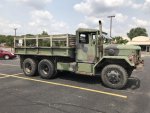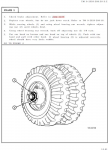Hi All,
This is my first time posting, been looking through the forums for several months however. I recently replaced a wheel cylinder in my deuce. Obviously the hub had to come off, and I'm looking for an opinion on the spindle nut tightness. I did a good amount of reading before doing all the work, and the most common answer I found was that the wheel should make a slight "tick/thump" sound when moved after the inner spindle nut is tightened.
I don't have a torque wrench, but I tightened the inner nut pretty tightly whilst spinning the wheel to let the bearings seat. I then backed off on the nut until I could give the wheel a good spin and it'd spin for ~20 seconds. If I remember, I backed off about 1/4 of a turn. I took a video of the sound that "I think" the other threads were referring to (the slight tick/thud when moving the wheel back and forth). After a few drives, the hub only seems to get lukewarm, quite a bit cooler than some of my other hubs that are due for a re-pack (I think I did a good job?). I've owned the truck for about 5 months now, learning a lot and I'm glad that there is so much information on these forums. I've linked said video here: https://www.youtube.com/watch?v=vs7uAbcz6wk
Thank you all!

This is my first time posting, been looking through the forums for several months however. I recently replaced a wheel cylinder in my deuce. Obviously the hub had to come off, and I'm looking for an opinion on the spindle nut tightness. I did a good amount of reading before doing all the work, and the most common answer I found was that the wheel should make a slight "tick/thump" sound when moved after the inner spindle nut is tightened.
I don't have a torque wrench, but I tightened the inner nut pretty tightly whilst spinning the wheel to let the bearings seat. I then backed off on the nut until I could give the wheel a good spin and it'd spin for ~20 seconds. If I remember, I backed off about 1/4 of a turn. I took a video of the sound that "I think" the other threads were referring to (the slight tick/thud when moving the wheel back and forth). After a few drives, the hub only seems to get lukewarm, quite a bit cooler than some of my other hubs that are due for a re-pack (I think I did a good job?). I've owned the truck for about 5 months now, learning a lot and I'm glad that there is so much information on these forums. I've linked said video here: https://www.youtube.com/watch?v=vs7uAbcz6wk
Thank you all!



